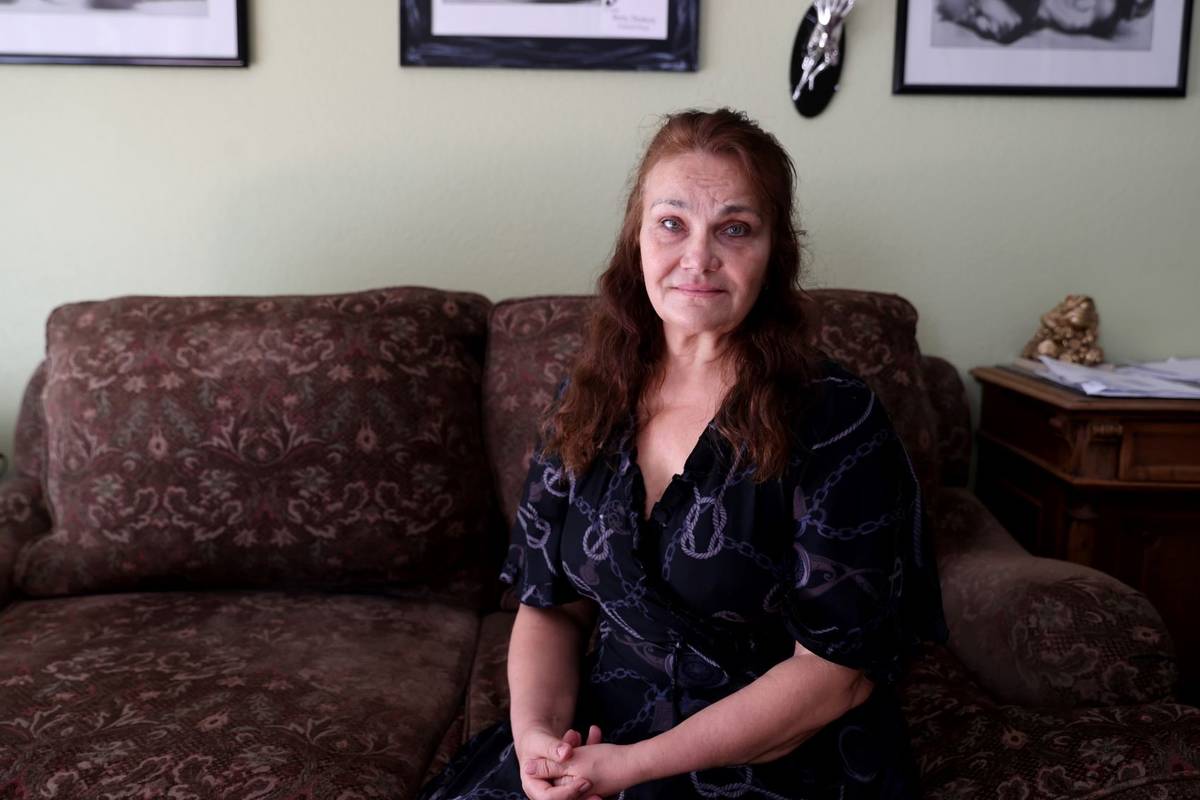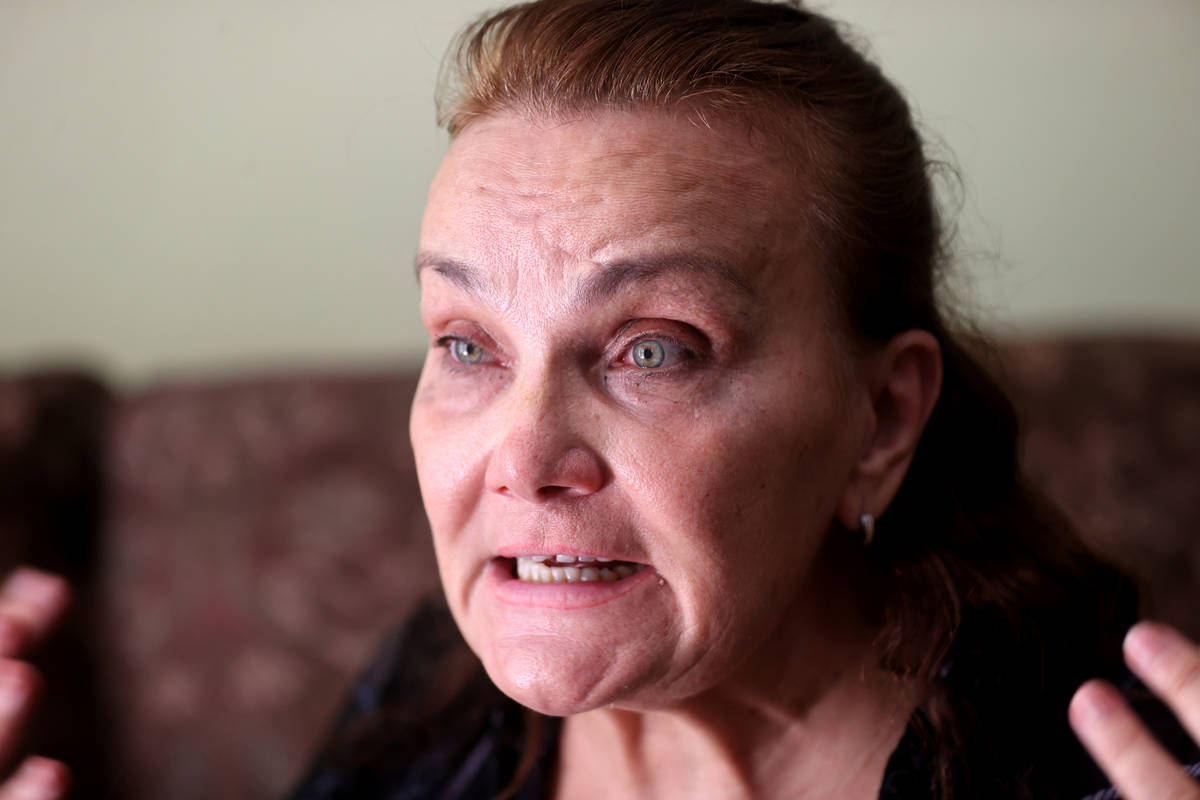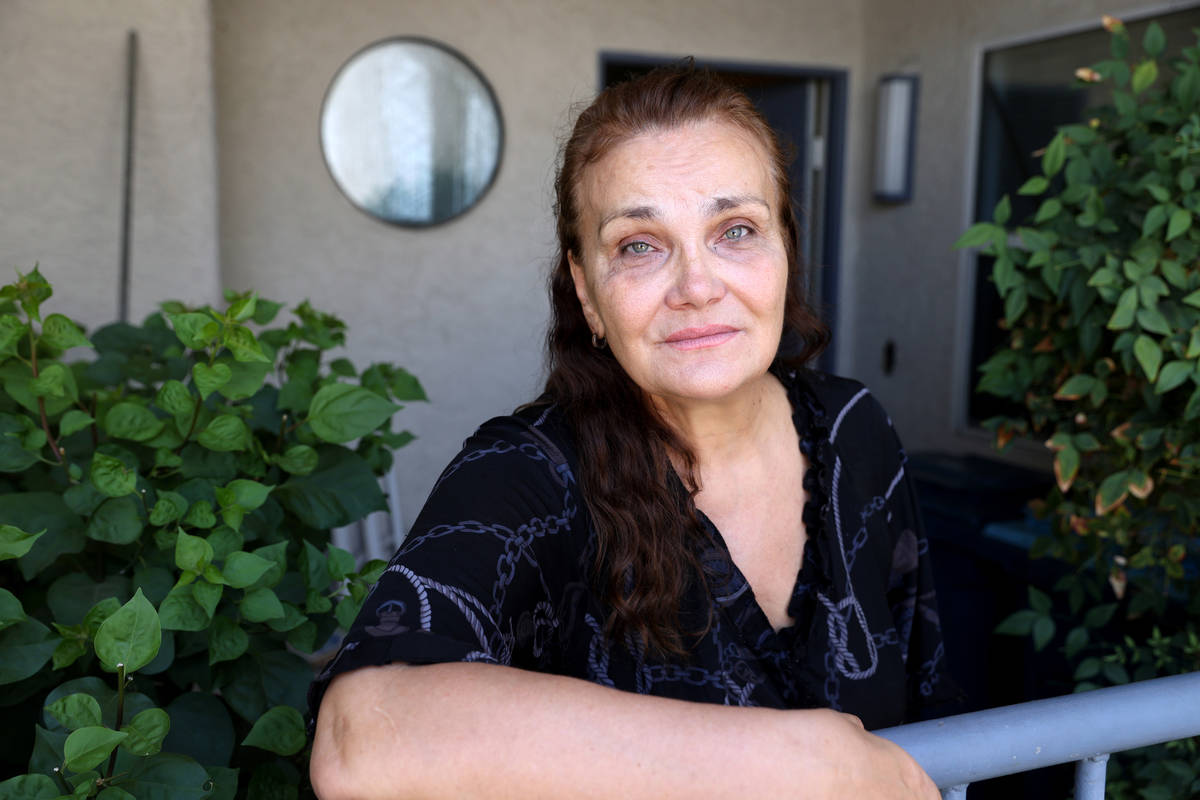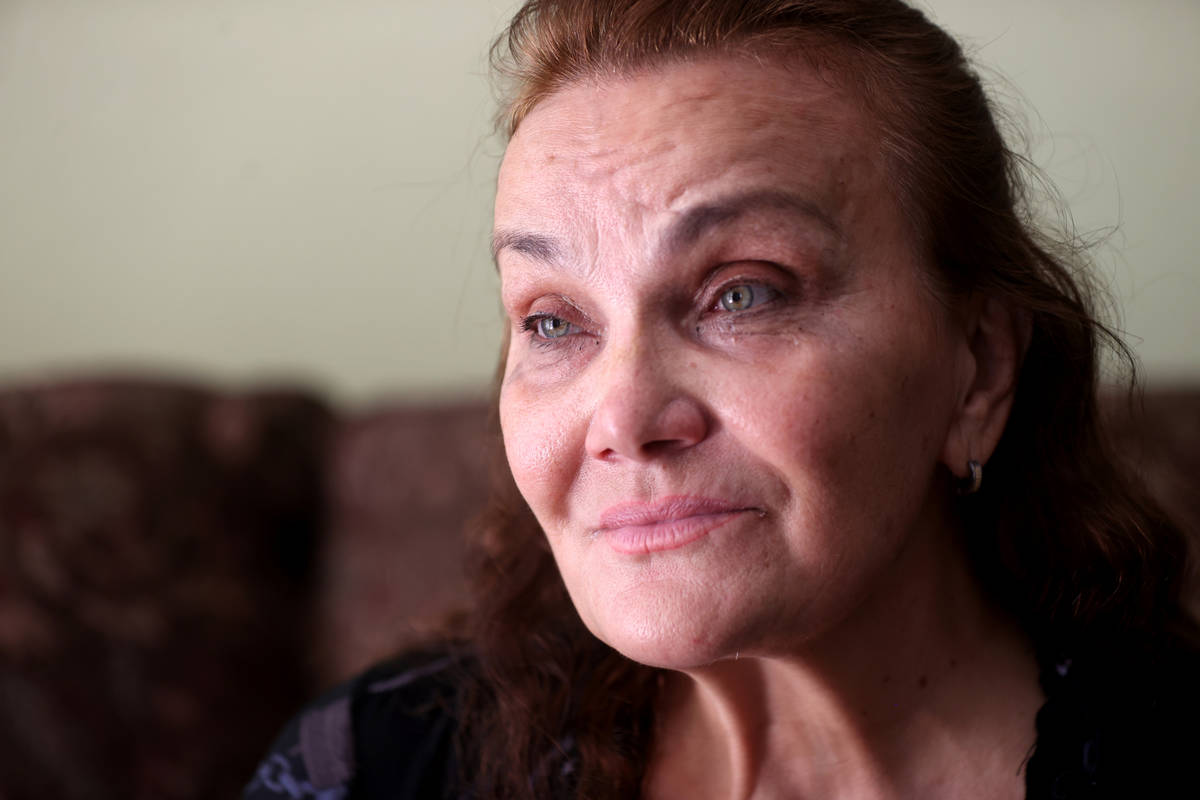Clark County could see tsunami of evictions when CDC moratorium ends
Las Vegas resident Lyubov Abato broke down crying Thursday as she explained the more than one-year fight to reclaim her property near North Las Vegas from tenants who stopped paying rent last year.
“It’s hopeless — the depression … it will kill me, absolutely kill me,” Abato said.
Spring Valley renter Kimberley Ireland is recently back at The Mirage working full-time after being laid off in March 2020. She’s trying to catch up on the thousands owed in rental payments but is scared her landlord will still evict her after July 31, when the federal moratorium ends.
“I send in whatever I can,” Ireland said of her payments to her landlord. “She doesn’t want to file (an eviction) if she doesn’t have to because she knows that’s not going to help me … (but) I don’t want to assume that she’s going to continue working with me.”
The coronavirus pandemic has wreaked emotional and financial havoc on landlords and renters for more than a year. And both sides will face continued headwinds even after the Centers for Disease Control and Prevention’s eviction moratorium ends July 31.
Experts have warned of a pending eviction crisis in states across the country, and data indicates Clark County will be faced with one as well.
To gauge the severity of Clark County’s eviction crisis, the Review-Journal partnered with the Eviction Lab at Princeton University to analyze eviction filings from 2016 through May 2021. The data compares the monthly average filings, covering 2016 to 2019, with the monthly number of evictions filed from January 2020 to May 2021.
The data will be updated monthly on Eviction Lab’s website and marks the first time that data on Clark County’s residential eviction filings have been tracked in real time and made publicly accessible.
Jacob Haas, research specialist at the Eviction Lab, said the county experienced a significant spike in eviction filings in November with 4,559 filings.
“The fact that in November filings were 50 percent above what they are normally — that’s not the case in really any of the other cities we track,” said Haas, who is responsible for processing Clark County’s data. “And that corresponds to when there was no local moratorium in place in Nevada.”
He noted the county had an estimated 22,400 eviction filings from March 15, 2020, to May 27, 2021, more than any other similar-sized area it collects data on.
In Dallas County, Texas, with a population slightly larger than Clark County, there were an estimated 18,600 filings for the same period. Philadelphia County, Pennsylvania, saw around 5,200 eviction filings, but that area is somewhat smaller in population, Haas said.
A brewing storm
Nevada’s economy shut down overnight on March 15 of last year when Gov. Steve Sisolak mandated the closure of casinos, restaurants, bars and other nonessential businesses.
The state’s unemployment rate soared from 6.4 percent in March 2020 to 29.5 percent in April, according to the U.S. Bureau of Labor Statistics.
By then, Congress passed the Coronavirus Aid, Relief, and Economic Security Act, which included a 120-day moratorium on eviction filings. Two months after that eviction ban expired, the CDC began its federal moratorium on Sept. 4.
Meanwhile, Sisolak bolstered the federal protection for Nevadans by implementing a series of statewide eviction moratoriums starting in March 2020 until May 31, 2021. The one period of time renters were not protected at the state level was between Oct. 15 and Dec. 14 — when the number of Clark County eviction filings leaped to its highest level during the pandemic though the federal moratorium was also in effect.
Since March 2020, a total of 11 overlapping extensions have been put in place with various guidelines at the state and federal level protecting eligible renters from an eviction for nonpayment of rent.
Jim Berchtold, Legal Aid Center’s directing attorney of the Consumer Rights Project, said the more complicated the moratorium became the less effective it was at stemming eviction filings.
“The jump in November was pretty high, but I think it was tempered by just overall confusion, which is kind of the hallmark of the whole last year and a half,” he said. “Landlords don’t know what’s going on. Tenants certainly don’t know what’s going on, so I think the November numbers could have absolutely been worse.”
Clark County’s monthly eviction filings, averages covering 2016 to 2019, hovers around 3,000 filings each month with slight dips from February to April.
During the pandemic, data shows eviction filings dropped significantly with April reporting only 65 filings, compared with a typical month of 2,799. Filings slowly rose but remained under 800 until October, when filings hit 3,000 or about 4 percent less than what is typically filed in October.
Mixed signals
Abato tried filing an eviction notice against her tenants for nonpayment of rent last year but was unable to because of the CDC moratorium.
Her tenants stopped paying their monthly rent of $1,200 by August and then provided her with a CDC declaration form in October.
Abato said she has tried selling her condo, near Rainbow and Lake Mead boulevards, so she could move back home to Russia and be near her children and grandchildren. But she’s already had two separate deals fall through.
Her first buyer, an investor, pulled out after learning the tenants were not paying rent. A second deal was supposed to close this year, but that buyer pulled out because her tenants did not move by the Jan. 7 deadline, after already receiving three move-out extensions.
“I’m not an institutional investor with deep pockets who can weather this,” Abato said.
While the data analyzed by the Eviction Lab shows thousands of evictions were being filed by landlords during the pandemic, it doesn’t offer a complete picture. Many landlords like Abato could not file an eviction for nonpayment of rent because of state and federal eviction moratoriums.
“The tsunami of evictions is going to happen,” said Nevada State Apartment Association Executive Director Susy Vasquez. “I know I’m bleeding $17 million a month just from my members (since April).”
Spring Valley resident Ireland was laid off in March 2020 from The Mirage. She was recalled back in the fall but as an on-call employee. The handful of hours she was able to work affected her weekly unemployment benefits because those hours must be reported to Nevada’s employment office and resulted in her making less money each month than if she were to stop working and remain on unemployment.
“It was rough,” Ireland said.
She considered looking for a new job instead of remaining temporarily on-call but said it wasn’t worth the risk, especially because she has been an employee at The Mirage for 12 years.
“It was high-wage pay, but I would have to sacrifice not having any medical insurance, which for me is more important than any high-wage salary,” she said. “I know most people think when you’re working in hospitality it’s just a job. It’s actually more than that; it’s an investment that many of us workers make because of the benefits, the wage and other incentives. Do I let my investment go down the drain or do I continue to fight for it?”
She learned about Clark County’s rental aid program in December through Culinary Local 226 and quickly applied. After nearly four months, she received an email stating her application was denied. Ireland said it’s still unclear why she was denied for rental aid.
“If I were to reapply, which is what the email stated, they’re going to go by the income since I’ve been back to work full-time, which would disqualify me. It’s a mess,” she said.
Ireland’s landlord hasn’t indicated any plans to serve an eviction notice but does want to sell the property.
“I hit another roadblock because if you look at any rentals, the amounts are astronomical … even the east side of Las Vegas,” she said. “If I were to catch up with rent that is owed, she might be willing to let my family and I stay a bit longer until we can find a place that’s decent and affordable.”
Sheltering in place
Nevada has taken steps since last year to slow the potential surge of evictions anticipated next month. It has created a temporary mediation program for landlords and tenants to resolve nonpayment of rent disputes and most recently the Legislature passed Assembly Bill 486, which provides stronger renter protections such as staying, or pausing, an eviction proceeding if a tenant has a pending rental aid application.
Peter Hepburn, research fellow at the Eviction Lab and assistant professor of sociology at Rutgers University-Newark, said the key to understanding the scale of the country’s eviction problem is having access to data such as eviction filings.
“At the height of the Great Recession, there were 2.8 million mortgage foreclosure starts. In a typical year, in a good year, in America there’s 3.7 million eviction filings,” he said. “Keep in mind there’s twice as many homeowners as there are renters, so you’re dealing with a much smaller population and many more of them facing this threat of displacement every year.”
He cited a recent study by a graduate student associated with Eviction Lab, who was able to drill down to the city block on eviction filings in 17 cities.
Hepburn cited the study’s data on Tucson, Arizona, where 295 buildings were found to be responsible for two-thirds of the cities evictions with the remaining one-third of evicting filings occurring across 9,000 buildings.
“If you were to target interventions and solutions at those 295 buildings, you could prevent an enormous number of eviction cases,” Hepburn said. “Without the data, how do you know where to focus your resources or where to intervene? Being able to see the problem is the first step in solving it, and at this point, we’re still operating in the dark.”
Contact Subrina Hudson at shudson@reviewjournal.com or 702-383-0340. Follow @SubrinaH on Twitter.
Behind the data
The U.S. government and most states including Nevada don't collect or track eviction data, although a new bill was introduced last week by House Democrats to create a national database on evictions and eviction filings.
While eviction records can be found through county court systems, such records can sometimes be difficult to access.
The Las Vegas Review-Journal partnered with the Eviction Lab at Princeton University to analyze eviction filings in Clark County.
The Eviction Lab is known for creating the first dataset on evictions in the U.S., going back to 2000, and makes its research and interactive tools publicly accessible. It also has an Eviction Tracking System that tracks weekly eviction filings in certain states and cities starting from 2020. The Eviction Lab currently tracks eviction filings in six states and 31 cities, including all of Clark County.
Eviction data for Clark County was collected from Las Vegas Justice Court, North Las Vegas Justice Court and Henderson Justice Court from 2016 through May 2021.
The courts in Clark County do not separate residential and commercial eviction cases, but Eviction Lab has removed commercial cases and duplicates from the Clark County dataset. While Eviction Lab has a robust filtering process, some commercial eviction cases could have slipped through and be included in the eviction filing figures.


























